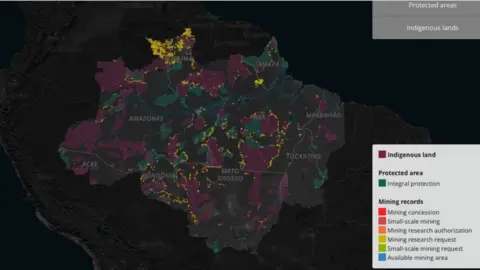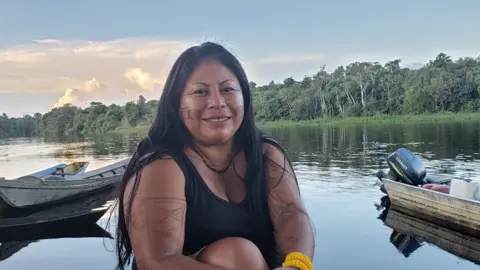Deforestation threat to Amazon indigenous areas if protected status changed - report
 Ricardo Teles/ Agência Vale
Ricardo Teles/ Agência ValeAreas of Amazon rainforest with a combined area the size of England could be threatened by new mining and deforestation, a new report claims.
It is currently illegal to mine in these protected indigenous territories of the Amazon.
But Brazil's President Jair Bolsonaro wants to change this to allow more exploitation for economic development.
US and UK companies are among those who had applied to open new mines, the report says.
But Anglo American and Vale both say they have withdrawn their applications.
Protecting the Amazon is crucial in the fight to curb climate change because its enormous number of trees soak up carbon from the atmosphere.
Thousands of indigenous people who live in these areas are also threatened by new developments.
"We are looking at deforestation in some of the most pristine areas of the Amazon. It will be a tragedy if mining on indigenous lands goes ahead," researcher Rosana Miranda, who wrote the report for NGO Amazon Watch, told BBC News.
"Are we willing to give up incredibly rich biodiversity and cultural diversity just to extract more gold and copper for international shareholders?" she added.
Amazon Watch and the Association of Indigenous Peoples of Brazil are identifying in real-time live applications to Brazil's National Mining Agency to begin mining projects in protected areas. The latest figure is 2,622 applications.
Brazilian company Vale has filed the largest number with 75 applications, while UK multi-national Anglo-American has 65.
Both companies had previously promised to withdraw some applications for mining in these areas after pressure from campaigners.
 Amazon Watch
Amazon WatchIn total, 570 companies have filed for permission to begin work in areas affecting 260 indigenous lands, covering 101,000 square kilometres (10.1 million ha). Almost half are for gold mining.
Anglo American told BBC News that it made applications to mine on indigenous lands but withdrew them "several years ago". It added: "Several of these applications have not yet been removed from the database of the National Mining Agency (ANM). Anglo American is working with Brazilian government representatives to ensure that on-line tenement databases actually reflect those that have been formally approved."
Vale commented: "Last year, the company announced the relinquishment of all its mining rights in Indigenous Land in Brazil (which includes applications for exploration permits and mining concessions)."
Mines run by global corporations in the Amazon have been associated with toxic spills, river pollution as well as the destruction of indigenous communities.
Alessandra Munduruku from the indigenous group Munduruku is an activist defending indigenous lands. "What is at stake in this mining project is death: death of the rivers, death of the forest, death of the people, death of culture, death of language," she told BBC News.
 Alessandra Munduruku
Alessandra MundurukuThe report also claims that huge amounts of international finance is supporting mining companies, suggesting that shareholders around the world are involved in deforestation of the Amazon.
Amazon Watch found that the global financial organisations Capital Group and BlackRock hold stakes worth $13.2bn in companies attempting to mine indigenous lands.
In total, eight large mining companies received $54.1bn in financing from banks or asset managers globally in 2016-21, the report claims.
Capital Group told BBC News it does not comment on its holdings. BlackRock did not respond to the allegations but highlighted their guidance, which says "BlackRock Investment Stewardship believes it is important for companies to obtain the free, prior, and informed consent of indigenous peoples for initiatives that affect their rights."
The applications are currently lodged with Brazil's mining agency. It remains illegal to develop these pristine and extremely biodiverse areas of the Amazon.
But President Bolsonaro says it is necessary to open up the rainforest to new exploitation and lift communities out of poverty.
He has proposed a bill to Congress that would make it possible to exploit these protected regions. Companies who have filed for the right to mine would be first in line, says Amazon Watch.
Campaigners say more development of the Amazon would be a disaster for the climate, and for the people living there.
At the COP26 climate change summit in Glasgow last year, 141 countries including Brazil signed a declaration to stop and reverse deforestation by 2030 and protect indigenous lands.
